MOROCCO
History

History

Cities in MOROCCO
| Marrakech |
History
From ancient times to the 19th century
The first known fact of the history of Morocco, which must have been inhabited by itinerant peoples at an early age, is the arrival of the Phoenicians and the Carthaginians from 1200 BC. They traded on the coast. In the last centuries before the beginning of our era, the area then called Mauretania (named after the Mauri or Moors) was ruled by the local monarchs. Most famous monarch from that period was Juba II (50 BC - 23 AD). After the death of his son Ptolemy, the area became a Roman province under the name Mauretania Tingitana. After the collapse of the Roman Empire in the West, the Vandals ruled for some time. After this, the area was controlled by independent Berbers until about 700, when the country was conquered by the Arabs and converted to Islam.
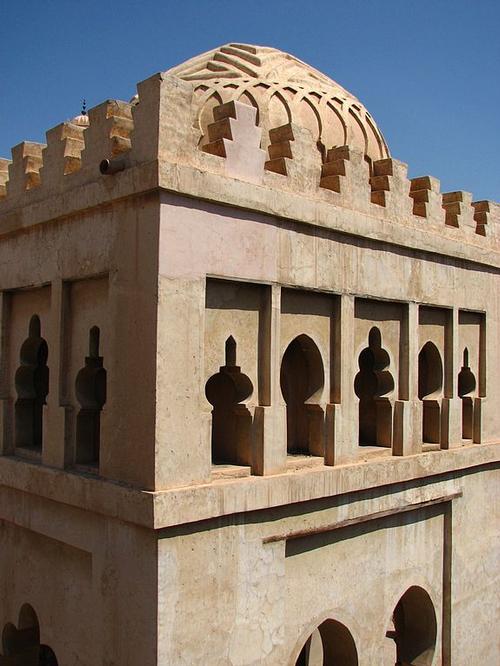 Almoravid Khoubba in MarrakeshPhoto: Kashmir CC 2.0 Generic no changes made
Almoravid Khoubba in MarrakeshPhoto: Kashmir CC 2.0 Generic no changes made
The Berbers continued to play an important role, in the middle of the 11th century sects arose among the Berbers that gave Islam a new militancy. Thus the Berber dynasty of the Almoravids (1056-1147) and Almohads (1147-1269) arose. Morocco became very important and twice conquered Spain. In 1269, the Almohads finally fell. Spain was turned over to Christians. The North African country was divided into three new dynasties. The Portuguese conquered Ceuta in 1415, the Spaniards in 1496 Melilla. The Moroccans benefited from European trade in the Mediterranean in their own way (Barbary pirates).
From the 19th century
In the 19th century, Morocco's international position changed due to the needs of European imperialism. After the conquest of Algeria by the French (1830), the Moroccans supported Abd el-Kader, which eventually led to war. After the Treaty of Tangier (1845), Morocco continued to benefit from its favorable location for a while. The Madrid International Conference (1880) regulated the country's position. The powers guaranteed Morocco's independence. In 1904, France concluded agreements with Morocco and England and Spain. Morocco was divided into an international zone in Tangier, a French sphere of influence and a Spanish sphere of influence.
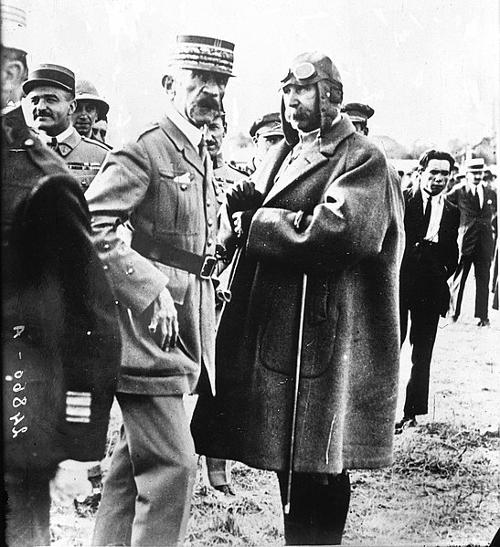 General Lyautey welcomes Marshal Pétain to Morocco during the Rif WarPhoto: Public domain
General Lyautey welcomes Marshal Pétain to Morocco during the Rif WarPhoto: Public domain
After that, the first Morocco crisis (1905) arose and France, despite opposition from the other powers, still occupied part of the country. In 1908, the ruler, Sultan Abd al-Aziz, was dethroned by his brother Mawlai Hafid, who also came into conflict with his countrymen. Then the second Morocco crisis (1911) broke out. The result of the negotiation was that Germany recognized a French protectorate over Morocco. Mawlai Hafid stepped down as a Sultan. His successor, Mawlai Joesoef, concluded the treaties of March 30 and November 27, 1912 with France and Spain. The 1904 agreement was revised: Spain retained the Ceuta and Melilla enclaves to the north and the Ifni enclave to the south, but in a reduced form. The first resident general in the protectorate of Morocco was General Lyautey, who managed to calm the country in a relatively short time. French troops helped Spain to suppress the violent rebellion of the inhabitants of the Rif (1921-1926). Lyautey was replaced in 1925 by a resident general, who effectively took full power, while the Sultan ruled by name only. In 1934 they had brought all of Morocco under their authority. Soon after, the first nationalists came, who had not yet immediately strived for independence.
1939-1970
Morocco joined France in 1939, and in 1942 joined General De Gaulle's Free French movement. The nationalists founded the United Independence Party in 1943, which demanded full independence for Morocco. In 1944 a second independence party, more oriented to the West, was established, the PDI. A period of fierce armed resistance from the Moroccans followed. In August 1955, the Moroccan resistance mainly occurred in the countryside, where many victims were killed. Ibn Yusuf was again recognized as a Sultan on November 5, 1955. On March 2, 1956, a French-Moroccan declaration followed that the 1912 treaty was obsolete and that the French government recognized Morocco's independence. A High Commissioner would represent France in the new state. On November 12, 1956, Morocco became a member of the United Nations, on October 1, 1958, of the Arab League. Spain recognized Morocco's independence almost simultaneously with France, while also renouncing its northern possessions in Morocco. However, it retained footholds at Ceuta and Melilla.
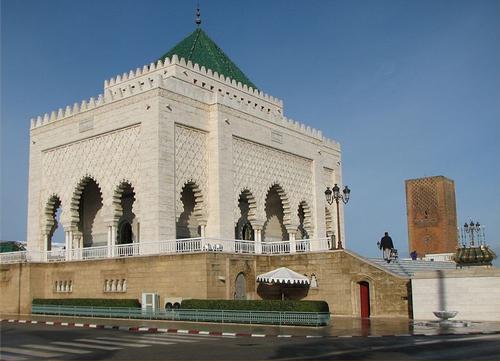 Mausoleum of Mohammed V in RabatPhoto:public domain
Mausoleum of Mohammed V in RabatPhoto:public domain
In December 1965, the United Nations passed a resolution requiring Spain to decolonize Ifni and Spanish Sahara. This resolution was implemented with regard to Ifni. On June 30, 1969, Ifni was officially transferred to Morocco. Sultan Mohammed ibn Yusuf, who assumed the title king in 1957, died in 1961. He was succeeded by his son Mawlai Hassan, who ascended the throne as Hassan II. A new constitution was approved by referendum in December 1962 and the first parliamentary elections were held in May 1963, with the royalists winning. In June 1965, Hassan overruled the constitution and formed a new government with himself as prime minister, with the aim of implementing his plans for administrative and economic reform.
From 1970
In August 1970, a new Legislative Assembly was elected, again regrouping the royalists. After a failed coup in July 1971, Hassan delegated all civil and military powers to General Mohammed Oufkir. On August 16, 1972, Air Force officers seized power. General Oufkir, who committed suicide shortly after, would have been in charge. The king decided to base his rule more on legality and offered the opposition parties ministerial posts in the cabinet of his brother-in-law Achmed Osman. In connection with the conflict over the Sahara, the king made attempts to get the political parties to cooperate with the system. In March 1979, a new broad-based government was formed under the leadership of Maati Bouabid. Furthermore, a National Security Council was chaired by Osman, which brought together all major political parties to deal with the situation in the Sahara.
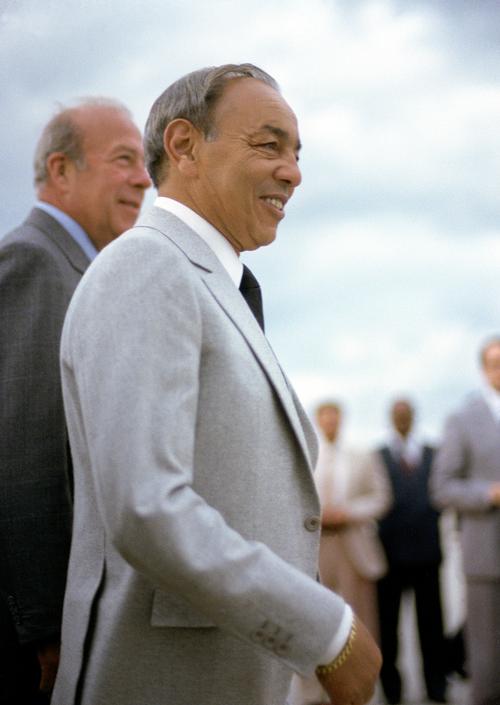 King Hassan II of MoroccoPhoto: Public domain
King Hassan II of MoroccoPhoto: Public domain
However, the king retained far-reaching powers and the persecution of political opponents continued. The abolition of food subsidies in early 1981 led to drastic price increases and intense social unrest. Massive strikes culminated in a massacre in Casablanca in June 1981. Universities were closed and hundreds of union members and members of the opposition party were arrested.
In the parliamentary elections in September 1984, the royalist parties and the RNI of Ahmed Osman obtained a large majority. Prime Minister Karim Lamrani was replaced in 1986 by Azzedine Laraki. In January 1984 and December 1990, bloody food riots continued. On the last occasion, Islamic fundamentalists also protested, protesting the participation of Moroccan soldiers (since September 1990) in the international force against Iraq. However, the Moroccan soldiers were not deployed in the liberation of Kuwait. In September 1992, a referendum was held on a new constitution with some reforms. Despite a boycott, the turnout would have been 97%. Elections in June 1993 were a great success for the opposition. King Hassan II died in July 1999. He is succeeded by his son King Mohammed VI.
Sahara
Mauritania was fully recognized by Morocco in January 1970 and a cooperation treaty between the two countries was signed in June of that year. An agreement was reached on 14 November 1975 with regard to the Spanish Sahara disputed by Morocco, possibly partly under the pressure that Hassan was able to exert through a 'peace march' organized by him by 350,000 Moroccans to this area. The area was then divided between the two ruffs. Polisario, fighting for an independent Sahara republic, then started a guerrilla war against both Morocco and Mauritania. Moroccan troops subsequently entered this part of the area and it was annexed to Morocco as the fortieth province. The issue of recognition of the Democratic Arab Republic of Sahara (DARS) proclaimed by Polisario led to a breach within the Organization of African Unity. Morocco broke off relations with states that recognized the DARS. In March 1993, the United Nations unanimously called on Morocco to hold the pledged referendum on the future of the region before the end of the year.
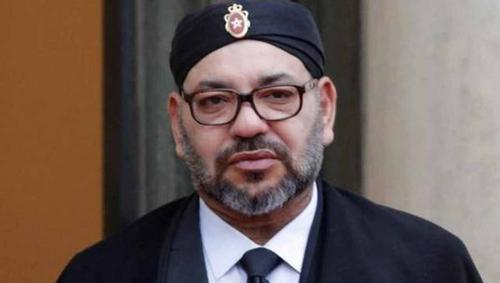 King Mohammed V! of MoroccoPhoto: MehdiBitw98 CC 4.0 International no changes made
King Mohammed V! of MoroccoPhoto: MehdiBitw98 CC 4.0 International no changes made
Morocco plays a prominent role within the Arab world. King Hassan has hosted Arab summits on several occasions. Relations with the EU have long been dominated by a conflict over fishing rights off the Moroccan coast. Partly due to Hassan II's intervention, an agreement was reached in October 1995, which partly met the wishes of Moroccan fishermen.
The long-announced referendum on the future of occupied Western Sahara was again postponed in 1996. After his accession to the throne in 1999, King Mohammed VI proved to be the king of renewal and reconciliation. A minister for human rights and a special Commission for Human Rights were appointed. Non-governmental organizations, including independent human rights organizations (including Amnesty International) were given more space to manifest themselves. The Interior Ministry was purged of those who had been involved in the repression, exiles were invited to return home, an arbitration board was charged with the payment of money to relatives of missing persons, and sheikh Yassine's house arrest was lifted. A policy of decentralization with a special focus on the economic development of neglected regions was also introduced and steps were taken to improve the rights of suspects (time limits and pre-trial detention have been restricted).
From 2000
24 parties took part in the parliamentary elections of 27 September 2002. The USFP and Istiqlal came in joint first place (50 out of 325 seats each). The moderate Islamic PJD came to 42 seats, tripling the number of seats in the previous parliament. There are 34 women in the new parliament, partly elected via separate electoral lists. The Jettou Cabinet is composed of members of six parties and a number of non-party directors. Prime Minister Jettou, Interior Minister Al Musthapha Sahel and Foreign Minister Mohamed Benaissa belong to this so-called 'sans appartenance politique'. The only new ruling party is the 'Mouvement Populaire'. The USFP and Istiqlal each provided eight of the 39 ministers. New is the portfolio for cases concerning Moroccans abroad. This fell to Ms. Nouzha Chekrouni (USFP), who was responsible for emancipation matters in the Youssoufi cabinet. Ms. Cherouni was the only woman in the Youssouffi cabinet. There are three women in the Jettou cabinet.
The PJD's seat gains in the September 2002 parliamentary elections indicate that Islamism and fundamentalism are gaining ground. In addition to movements with roots in the Moroccan spiritual tradition, such as the Jama'at al-Adlw-al-lhsan of Sheikh Abdessalam Yassine, there are various movements that operate from an ultra-orthodox philosophy that comes from abroad.
On May 16, 2002, Casablanca suffered a series of suicide bombings. There were 18 victims, the majority of Moroccan. Groups such as Al-Salafiyya al-Jihadiyya and Al-Sirat al-Mustaqim are associated with the attacks. The first suicide bombing trials started in mid-2003. In addition, the death penalty was demanded against a number of suspects.
The establishment of a truth commission (Instance équité et réconsiliation) exposes violations of human rights that took place during the reign of King Hssan II. This happens in an atmosphere of growing openness on the part of the government. Victims are given the opportunity during hearings which were directly reported by television to tell about abuses committed without mentioning the names of those responsible.
The reforms of King Mohammed VI (which were already initiated in the last years of the reign of King Hassan II) are slowly but surely leading to a different, much more open climate in Morocco. There is less and less fear, more can be said and there is greater freedom of the press. However, there are clear red lines; the role and position of the monarchy itself, Islam and Western Sahara.
An important step forward in the field of human rights has been taken with the establishment of a national reconciliation committee (Instance Equité et Réconciliation). Morocco's past has been discussed by the committee, the "years of lead" characterized by repression of the opposition and gross human rights violations. To some extent justice has been done to the victims, by letting them tell their story and by awarding damages. In addition, the committee has formulated a number of recommendations, which explicitly look to the future. Some of the recommendations, if implemented, would make the position of the monarchy less absolutist (constitutional reforms, strengthening the independence of the judiciary, strengthening security services regulations).
With the introduction of the new Moedawanah (all family law), Morocco has taken a major social step, which should eventually lead to an equal relationship between men and women. Another important development concerns the increased space and attention for the Berber culture and language. The king has also spoken out about the need to strengthen social security policy. In concrete terms, this has only led to the introduction of a new compulsory health insurance for employees, civil servants and pensioners as of 1 March 2006 and a new Labor Act.
In June 2007 talks between Morocco and the Polisario on Western Sahara under the supervision of the United Nations take place, the talks yield no results. In September 2007, the conservative Istiqlal party wins the most seats in the parliamentary elections. In 2008 and 2009, trials are being conducted against Islamists suspected of involvement in bomb attacks in Casablanca and Madrid. In July 2009, Abdelkader Belliraj, a Moroccan al Qaeda leader, was sentenced to life in prison. In the 2011 elections, moderate Islamists and the developing party (PDJ) win, but none of the political parties obtained more than 20% of the vote.
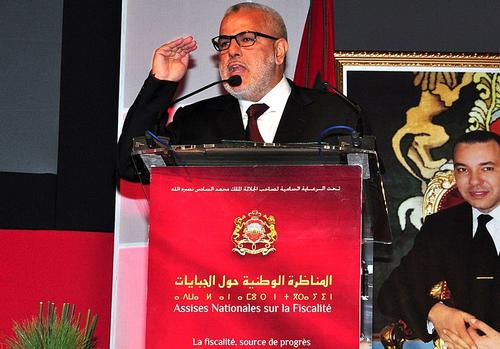 Benkirane Morocco
Benkirane Morocco
Photo: Magharebia CC 2.0 Generic no changes made
In January 2012, Abdelilah Benkirane of the PJD becomes Prime Minister of a coalition. In October 2013, the king appointed a new government, which was necessary because one of the coalition partners had left the government. In September 2015, Morocco will hold the first ever direct elections to regional councils. In the October 2016 national parliamentary elections, the Benkirane party wins the most seats and the king reappoints him as prime minister. It is restless in the Al-Hoceima region in 2016 and 2017. In March 2017, the king fires Prime Minister Benkirane for failing to form a coalition. El Othmani becomes the new prime minister. The next elections are planned in the autumn of 2021.
In December 2020, Morocco signed a normalization agreement with Israel, similar to those that Bahrain, the United Arab Emirates, and Sudan had concluded with Israel earlier in 2020
The liberal National Rally of Independents party led by oil and gas billionaire Aziz Akhannouch narrowly won the September 2021 election, ousting the conservative Islamist PDJ party that had led governments for a decade.
Sources
Encarta Encyclopedia
Lehmann, L. / Marokko
Van Reemst
Macguinness, J. / Morocco handbook
Passport Books
Wilkins, F. / Morocco
Chelsea House
CIA - World Factbook
BBC - Country Profiles
Copyright: Team The World of Info